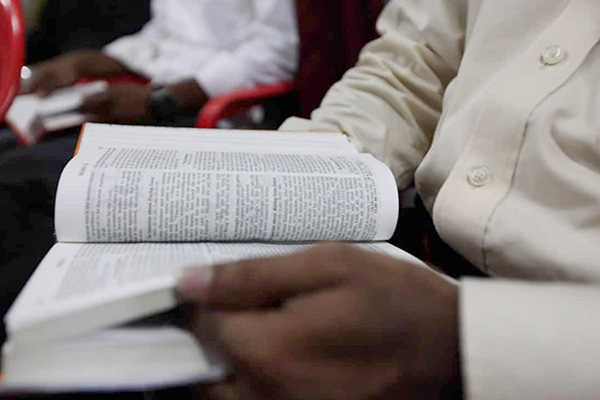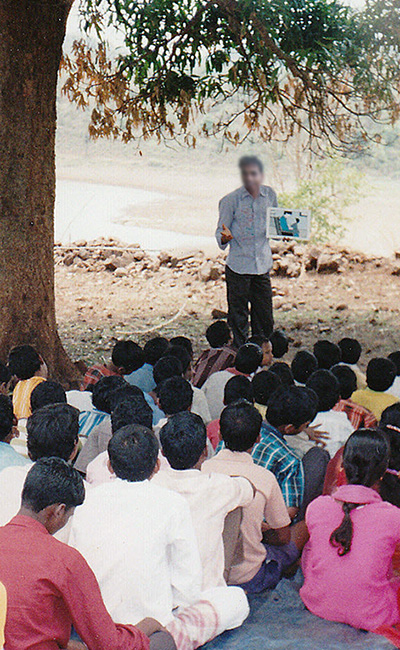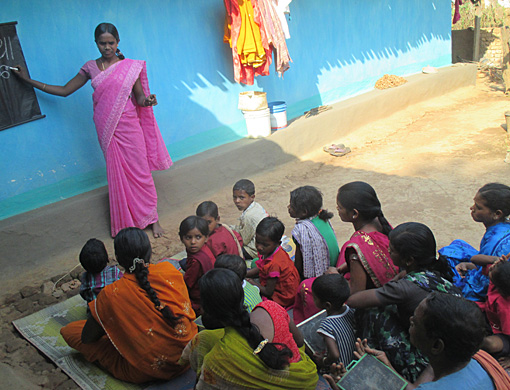THE PRINCIPLE OF SPIRITUAL MULTIPLICATION
Each minister trained by IET is required to plant a church, disciple, and shepherd a church until a mature body of believers is established. Then they must train a few members of that church for church-planting work. The original minister then repeats the process in another unreached village. Based on previous experience, we estimate that at least 40 pioneer churches will be planted for each trained church planter.
IET’s primary call fulfills the Great Commission by planting healthy, reproducing churches among the unreached peoples and by raising up indigenous leaders who eventually lead church planting movements in each cultural or geographical group.
IET’s goal is to go where none have gone before and establish Christ’s Kingdom on this earth.
Training Indigenous Missionaries and Church Planters
We fully believe that a discipled community of believers is the end result of the Great Commission being truly fulfilled in a given geographical area. IET, therefore, is committed to planting pioneer churches among the unreached and then raising up called, indigenous leaders to lead.
Indigenous ministers are better equipped to communicate the gospel in culturally appropriate ways and in the local language, as they are from the areas where they minister. It is also strategic and healthy for any movement to be ultimately led by indigenous ministers. So, IET focuses on training pastors and ministers with proven character and leadership potential. Also indigenous leaders do not have to climb over the many social and cultural barriers that are faced by ministers from overseas. They are able to live at the level of the people they serve. It is truly amazing to see the Gospel being preached to those who have never heard it before, and see it become relevant to them because it is being preached from one of their own.
SALTDC
IET’s main Bible College, called South Asia Leadership Training and Development Center (SALTDC) is accredited by ATA (Asia Theological Association). SALTDC provides higher leadership in-residence courses and ministry training to those with potential to become national leaders. These trained church planters are equipped to lead one or multiple church planting movements.
SALTDC also provides continuing advanced leadership training to active ministers, allowing them to continue to remain on location.
Bible Schools: Beersheba Bible Institutes
IET also has Bible schools spread in different parts of South East Asia. An experienced church planting leader lives on the same campus with the trainees. This close mentorship is critical in the formation of the students. The school trains future church planters from that region in its unique regional language and within their cultural context.
The students participate in the local church ministry every evening, learn evangelism by doing it every weekend, are instructed from the Word of God by experienced teachers during day, and are trained in church planting and ministry during required ministry internship with an experienced minister. A close focus is also placed on developing their character and spiritual disciplines in addition to ministry skills.
New believers who show a call of God for church planting and prove it within the ministry of their pioneer local church are carefully watched by their pastor; interviewed by the IET leaders and then selected to be trained as future church planters and pastors among their own linguistic and people groups. At the end of their two year intensive training period, they are ready to be ambassadors of the Gospel message. 100% of our graduates are sent to places where there is no church.
Constructing Church Buildings
Why church buildings?
The growth of believers in an area also makes it necessary to move beyond the small, cramped huts of individual believers. Villages rarely have a large and public facility available for rent. The towns that do have such facilities refuse its availability to Christians. In addition, meeting in the open or under the shade of a tree is not possible for more than half of the year, particularly during the prolonged monsoon season, extreme winter months [in north India], and the cruel scorching summer.
Moreover, any such gathering creates an impression of Christianity as belonging to those ‘outcastes’ instead of remaining as a viable option for ordinary citizens, as part of regular community life. This creates a negative impact and, obviously, limits the growth of Christianity in that village and those surrounding it.
We have also found that a church building creates a feeling of stability for the new believers. Such a four-walled ordinary building also becomes critical to hold Christian events such as weddings, granting a sense of respectability to Christians.
A common place of worship also allows people from different castes to come and hear the Gospel together. Some believers, who have not yet come under the conviction of the Holy Spirit, will not go into the house of some other castes.



